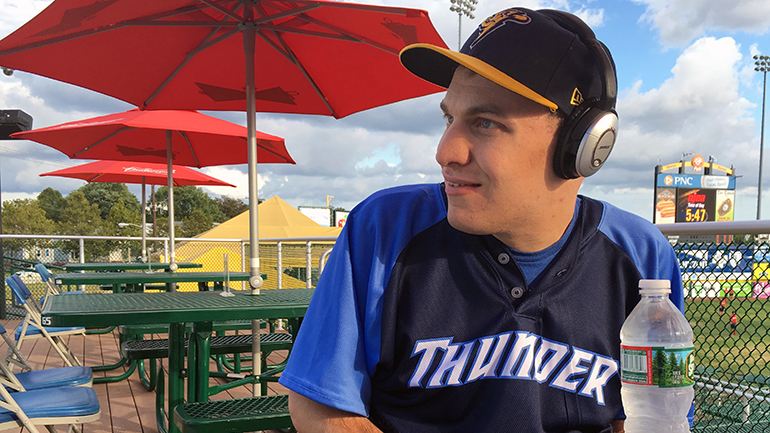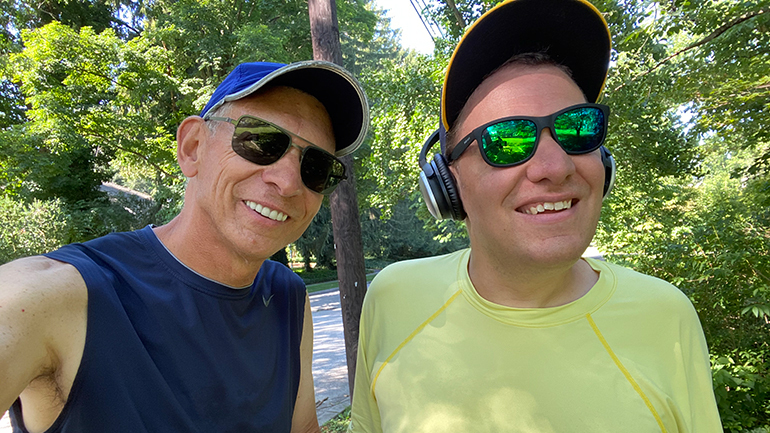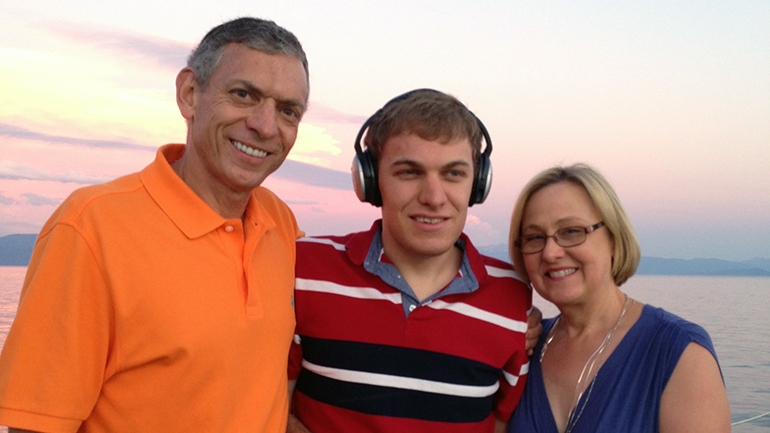My son is one of millions of beneficiaries of ADA
Note: The following article was originally posted to LinkedIn by John Pluhowski, TD Bank's Chief Communications Officer, Corporate & Public Affairs and U.S. Executive Lead for Individuals with Diverse Abilities (IwDA). John also serves on the board of Disability:IN, the leading non-profit resource for disability inclusion around the world.
Yesterday wasn’t just another lazy Sunday. Three decades ago, my wife Susan and I received news that would transform our lives forever. On that gray, muggy morning in Houston, a doctor coolly informed us that our beautiful two-year old son, John Byron (JB), would probably never be able to brush his own teeth, make a PB&J sandwich, sled down a snowy hill or tell us “I love you.” JB suffered from what the doctor blankly described as “persuasive developmental disorder, not otherwise specified.” In other words, he was “mildly retarded,” a clinical footnote captured in his evaluation. We were crushed.
It was five months after the Americans with Disabilities Act (ADA) had been signed into law. I had scarcely thought about this monumental legislation until it suddenly hit home, hard. Since then, each and every anniversary has inspired me to take stock of our family’s achingly difficult yet rewarding experience and pay it forward by helping those who are struggling through their own journeys.
As for our beautiful son JB, now 32 years old, he along with millions of Americans are the beneficiaries of the ADA. We thank the founding fathers and mothers of this landmark legislation and all the groups it has spawned to advance disability justice here and around the world. Today, JB is more independent, capable of managing some of his own health needs. He has become a passionate artist, a fitness nut and a favorite uncle. As a result, our whole family is happier and healthier. No question, it hasn’t been easy, but nothing worth fighting for ever is.

A Work in Progress
Designed to maximize labor force participation among people with disabilities, the ADA requires companies to provide workers with reasonable accommodations to perform essential job functions. Since its inception, our country has made incredible strides under its auspices. Yet we remain a far cry from empowering people of all abilities to fulfill their professional potential.
Here is the sober reality: As of July 2018, only 29 percent of Americans of working age (16-64) with disabilities were employed, compared with 75 percent of those without a disability, according to the Bureau of Labor Statistics. And this was before a global pandemic amplified the schism between the haves and have-nots.
Thirty years from now, I am optimistic that public and private sectors will have made dramatic inroads in achieving full disability inclusion and equality, buoyed by heightened social consciousness and innovative technologies like remote computing, artificial intelligence, machine learning, self-driving cars and so on, accelerating our path to what disability advocates like Ted Kennedy, Jr., Board Chair of the American Association of People with Disabilities (AAPD), call the “final frontier of the civil rights movement.”

To accelerate our path, here are four ways to honor the spirit and practice of the ADA:
1. Stay woke: American actor/comedian Robin Williams said it best, “Everyone you meet is fighting a battle you know nothing about. Be kind. Always.” For those of us that believe individual acts of kindness can lead to a sea change of social good, I urge you to act small and think big. While JB encountered no shortage of injustices, I have cherished all the quietly spectacular, often spontaneous expressions of goodwill directed toward him, some from businesses that instantly earned my lifelong loyalty. Like Crank 3, whose owner had all the time in the world to custom fit JB for a tandem bicycle while customers stood impatiently at the register. We became weekly patrons, regardless of whether we were in the market to buy more bike accessories.
Through my work with Disability:IN, the leading nonprofit resource for business disability inclusion worldwide, I’ve been fortunate to meet scores of college students who gained meaningful employment with our 200 corporate partners, including TD Bank. And I can assure you that all of those talented young people, plus their families, friends, teachers, caregivers, neighbors remain deeply loyal to those brands. Yes, it’s good policy, but it’s also good business.
On the flip side, no bad deed goes unpunished: Never before have so many people had so much time to scrutinize your every move. And never has word spread so clicking fast. Be forewarned: The world is watching. Do the right thing.
2. Raise your hand and your voice: No one will be a stronger, more passionate advocate for your cause than you. Fighting for my son’s rights was a responsibility I wholly embraced. No matter how stressful, frustrating or busy, Susan and I eagerly volunteered to serve as liaisons in our public school systems and help parents tackling similar challenges. I grew to relish the opportunity to meet with school board officials in public forums when I felt they were dragging their feet in pressing for reform for students with disabilities. Don’t be shy to inject a little healthy tension along the journey, it can be a powerful and force behind meaningful, sustainable change.
By helping JB, we were simultaneously supporting the larger cause. Over time, it became my mission to carry the torch for a movement that is sweeping the world – a demand for justice for those who seek a shot at equal opportunity, competitive compensation and economic freedom.
3. Join the charge: As a father of an adult son who is non-verbal and on the autism spectrum and TD’s U.S. Executive Lead for Individuals with Diverse Abilities (IwDA), I feel incredibly privileged to work for a company that actively promotes diversity and inclusion, encourages colleagues to get involved, and empowers people of all backgrounds and abilities to thrive.
At TD Bank, our “culture of care” reflects our core purpose: to enrich the lives of our colleagues and customers and the communities we serve. To this end, Bharat Masrani, TD Bank Group President and CEO, recently outlined our plans to combat racism and its impacts. Here was a bold and decisive call-to-action and an invitation for everyone and anyone to take part in the effort.
The bottom line: Organizations that create opportunities for employees to participate in vital social causes raise awareness, deepen engagement and, most importantly, mobilize enduring change. Uniting for a common goal connects us to our communities and each other.
4. Work your values: The number one way we can drive change is to leverage our collective labor and consumer power by choosing to work for, and patronize, businesses that place purpose over profits. Fortunately, companies that value purpose typically value their employees too.
According to Accenture’s “Getting Equal: The Disability Inclusion Advantage” companies that implement best practices for employing and supporting people with disabilities generally outperform their peers. Over a four-year period, the 45 companies that Accenture identified for outstanding leadership in disability employment and inclusion had an average of 28 percent higher revenue, double the net income, and 30 percent greater profit margins than their lower-performing counterparts on the Disability Equality Index (DEI), a benchmarking tool that offers U.S. businesses an objective score of their disability inclusion policies and practices.
Happy birthday, ADA
As my family and I commemorate the 30th anniversary of the ADA, I encourage all of you — friends, colleagues, fellow and sister global citizens — to join in our collective march toward building a better society that enables each and every one of us to access the education, resources and opportunities we justly deserve to improve our lives, our world and our future.
So, when the going gets tough (which it certainly will), I hope you will remember these timeless words from prescient Dr. Seuss: “Unless someone like you cares a whole awful lot, nothing is going to get better. It’s not.”

